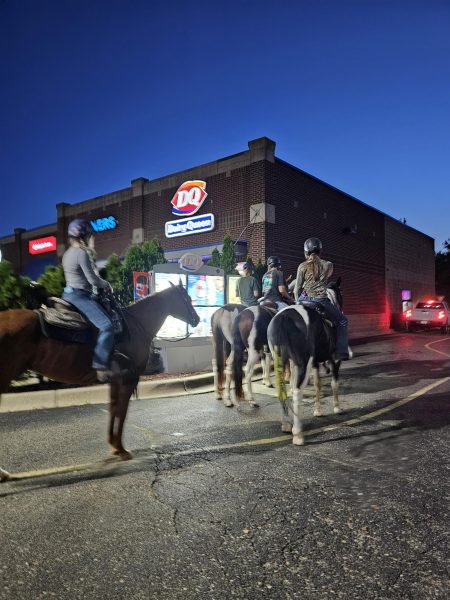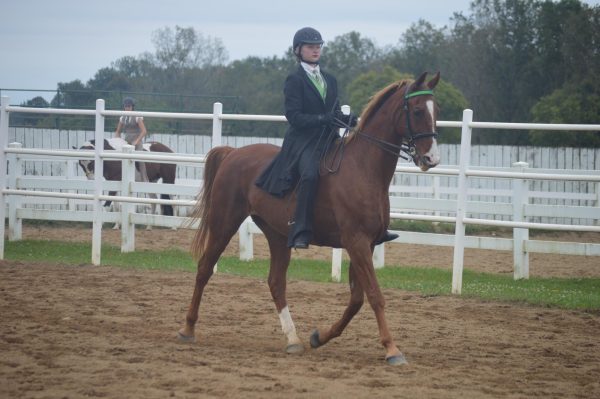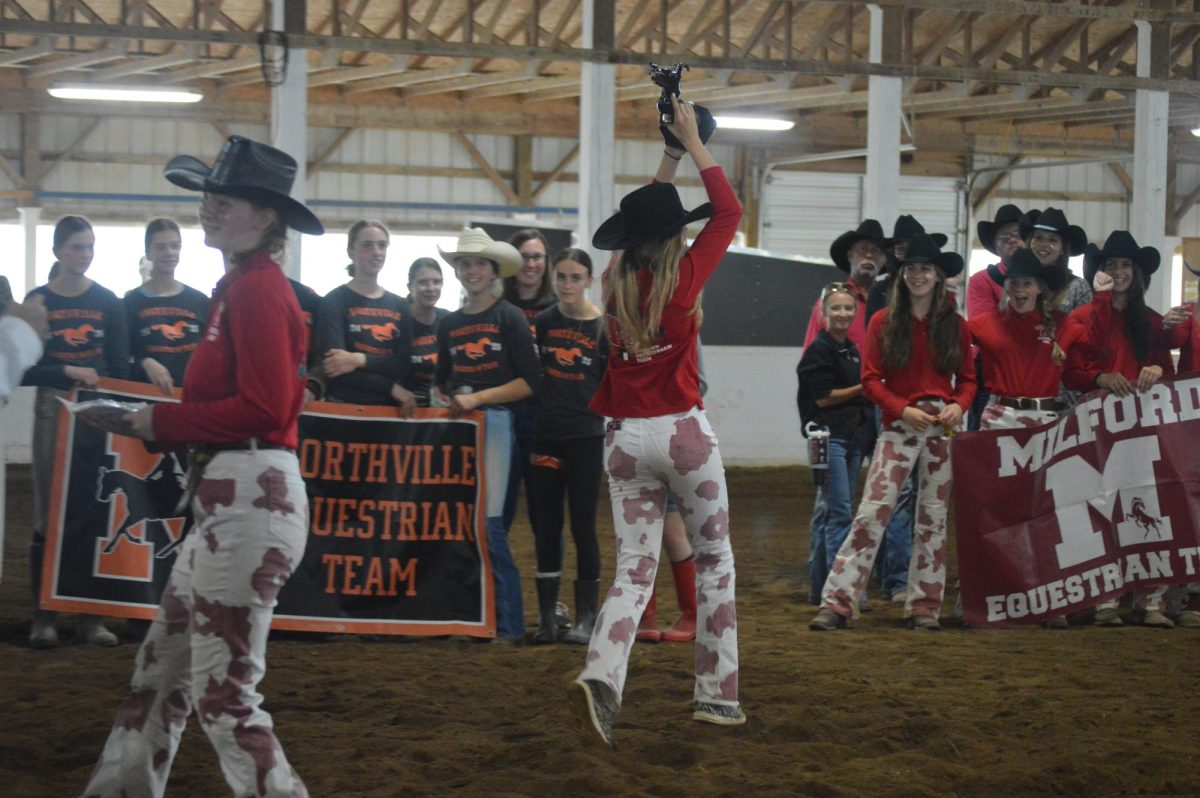Equestrian is an expensive sport with the animals costing thousands of dollars to board and feed. These large, beautiful animals require a lot of maintenance- food, water, riding, cleaning- things that take hours and countless bills, not even taking into account their health. When junior Avery Jarecki’s horse was injured, her family spent around $20,000 on surgery, paid for two years of rehab, and then had to pay for additional retraining. During show season, junior Rylie Gunn took her horse to a deluxe veterinary clinic and spent $4,000 just for a check-up. If the horse simply makes one wrong leg movement, riders can be out thousands of dollars to repair the damage. However, the people who have invested so much have developed a deep love for their animals and their sport.
Senior Kara Peltier spent time before practice working with and taking care of her horses. “It took hours a day, and a lot of dedication,” she said. Yet she has managed to stick with it as she has been competing since fifth grade.

(Kendall Kopp)
When Jarecki started riding at a young age, she had to clean the barn before she could ride. “I was dying because I just came out of dance,” she said, but after mucking out the barn and getting the 50-pound saddle on, she had a “connection with the horse.” She continued, “It was worth all the sweat and getting cut up.” While Jarecki worked hard and aspired to be able to ride a horse, that aspiration was not the same for every member. This was quite the opposite for Gunn, as she was thrown into it by her mother. But after that initial beginning period, she grew to love it.
“Show season” begins in July and ends usually around October. The first equestrian meet took place during the first weekend of school. While this is one of the few co-ed sports, Milford’s team this year was all girls: two sophomores, three juniors, and one senior.
Stephanie Keltz, the beloved head coach of the team, has been a volunteer equestrian coach at Milford for 15 years. “They are really great riders, they are really great equestrians,” said Keltz. “They are great girls, as far as being just really good humans as well as being really fun to coach because they just worked so hard, tried so hard, were really motivated.” The girls’ dedication to not only practicing, but taking care of their horse makes equestrian unlike any other sport.
This year’s team was motivated and hardworking; and their efforts, countless hours of practice, 6 a.m. wake-ups, over 12- hour long days, and four to eight hours of prep work before shows were not wasted. They competed as a team for the Michigan Interscholastic Horse Association (MIHA) in Division B against other schools in that same division. The Divisions are made up by the number of people, and broken down into a district of meets where the top two teams advance to Regionals.
Milford, which is one of the founding equestrian teams, is District One, which is the largest district. MIHA bloomed from there and is now a multi-state organization, Keltz stated.
For MIHA showings, which are equestrian competitions within that program, they mainly compete in a variety of equitation events. Equitation is the way an owner rides their horse, performing different techniques and patterns- for example, cantering from cone A to B and completely stopping at cone B. For other non-MIHA showings, they do pleasure showings- which is how well the animal moves, looks, and their breed. Division B has 42 classes where the riders can each showcase about 10 classes of their best skills.
The riders must navigate patterns on the horse or even on the ground, and these patterns are different for each show, which is why practice usually runs two to four hours every Tuesday and Thursday. They split practice between equitation and conditioning for speed. Speed events, like cloverleaf barrel racing, which is where the rider and horse go around barrels in the pattern of a cloverleaf without knocking any down, require practicing turns and technical aspects that are timed. Keltz was very proud of her team this year for placing first for District One, Region B overall champions, and finishing in the top 10 for the State Finals. “They worked so hard and came together to really do a dynamite job,” said Keltz.
“I have always been with horses. I grew up with horses like people grow up with dogs.”
— Kara Peltier
Equestrian is not all about the athleticism of the horse. The rider must be in good physical condition and must have muscle memory for all the patterns and movements used in riding to prevent the horse from getting confused. The rider also must learn how to take a fall, and sometimes, “You just have to accept it and throw yourself off before they hurt themselves,” said Jarecki.
Many of the riders either own their horses or lease them. Jarecki, (who owns Takoda) and Gunn, (who owns Izzy), both own their horses and lease them to other riders. While they keep their horses in barns with constant care, Peltier owns her horses named Elvis and Eleven and keeps them at home. Peltier has “always been with horses. I grew up with horses like people grow up with dogs.”
Riders generally have at least two horses, whether owned or leased, so they don’t wear them out. Peltier does jumping events with Elvis and does speed events with Eleven. Horses have their own skills, and as Keltz said, “the horses are very proud of themselves. They enjoy doing it too.”
Though the team is made up of individual riders, they all work together to win points. “It doesn’t really matter who is on your team,” said Keltz. “You are all equally important because one person cannot carry the entire team.” Keltz had her doubts for this year as most of the riders had new horses that they had to train for competition. “They worked so incredibly well as a team, they were so inspired and motivated. It was really exciting to see what they accomplished,” Keltz continued, “We never thought that they would accomplish so much.”

(Kendall Kopp)
With the team spending so much time together during the competition season and beyond, this close group of girls is more of a family than a team. As Gunn put it, “Everybody’s more than just friends, it’s like a whole big family.” Jarecki wouldn’t want the team bigger, it’s perfect how it is. “They’re all fun; they’re all family. They’re always there if you need something, team or not, they’ll always be there,” said Jarecki. And their coach makes up the head of the family, with Jarecki saying she’s “good strict,” meaning she has rules they follow but is still caring towards the riders. They also have other coaches, and as Jarecki said, “they do a lot for us, in just volunteering, they do it all for us.”
They do family things, like celebrating birthdays and supporting Keltz’s 11-year-old rising star daughter by going to her equestrian shows and she also attends theirs. “They definitely are like sisters, like family,” said Keltz. The MHS Equestrian team is a family…a family with some very large and athletic pets.
